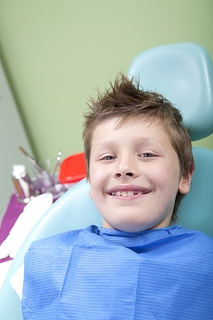Can my child really avoid tooth decay?
November 7th, 2013

Great question! Yes, in fact, tooth decay is preventable! Decay, which is caused by sugars left in your child’s mouth, can turn into an acid, which in turn can break down his or her teeth. Children are at high risk for tooth decay for a simple reason: many children and adolescents tend to be lax in their oral hygiene habits.
So, how can your child prevent tooth decay?
- Start early. After the age of two, brush your child’s teeth with fluoride toothpaste twice a day. And, if possible, clean between the teeth with dental floss at least once a day, preferably before they go to bed.
- Don’t allow your little ones to eat after cleaning teeth at bedtime, as salivary flow decreases while they sleep and their teeth become vulnerable to cavities.
- Do not allow your little ones to nibble food or sip drinks continuously, and keep in mind that a low-sugar diet also helps keep tooth decay at bay. Allow time between meals for saliva to neutralize acids and repair the teeth.
- Drinking water frequently throughout the day can also reduce the possibility of new cavities forming.
- Dental sealants can also protect your children’s teeth from cavities. Sealants, which are applied to the chewing surfaces of molars, act as a shield between the tooth and harmful bacteria.
Finally, make sure your child visits Highlands Dentistry approximately every six months for a checkup and routine cleaning! Please give us a call at our Issaquah, WA office.
































 Memorial Day weekend, a time to remember and honor the men and women lost while serving for our country. Memorial Day is also the unofficial start of summer, and for many folks getting out of town for three days after being cooped up in the classroom or the office spells sweet, sweet relief.
Memorial Day weekend, a time to remember and honor the men and women lost while serving for our country. Memorial Day is also the unofficial start of summer, and for many folks getting out of town for three days after being cooped up in the classroom or the office spells sweet, sweet relief.





 Even if you brush and floss daily, it is still important to see us at
Even if you brush and floss daily, it is still important to see us at  A few weeks ago, we asked you, our wonderful patients, what you most liked about your experience at
A few weeks ago, we asked you, our wonderful patients, what you most liked about your experience at  Website Powered by Sesame 24-7™
Website Powered by Sesame 24-7™